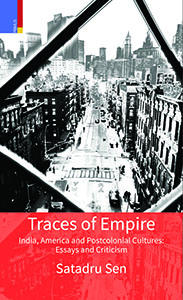
Traces of Empire-India, America and Postcolonial Cultures: Essays and Criticism
AUTHOR- Satadru Sen
| HB ₹995 . $59.95 . ₤39.95 |
||
INFORMATION
- AUTHOR : Satadru Sen
- HB ISBN : 9978-93-80607-95-5
- Year : 2013
- Extent : viii + 262 pp.
- Discount available on checkout
- Usually dispatched within 3 to 5 working days.
Traces of Empire-India, America and Postcolonial Cultures
| HB ₹ 995 . $ . ₤ |
PB ₹ . $ . ₤ |
|
| POD ₹ . $ . ₤ |
e-Book ₹ . $ . ₤ |
INFORMATION
- AUTHOR – Satadru Sen
- ISBN – 9978-93-80607-95-5
- Year – 2014
- Extent: 400 + 40 coloured illustrations
- 10% discount + free shipping
- Usually dispatched within 3 to 5 working days.
The culture of the modern world is, in many ways, constituted by interwoven strands of empire and resistance. The essays in this volume examine some of those strands, primarily in the contexts of India and the United States, but also in other parts of the world, such as Germany and Israel-Palestine. They highlight not only the particular histories of cultures of power and desire, but also the convergences of forms of power and desire originating in different historical settings.
What, for instance, links the culture of schoolchildren in the Indian hinterland with the isolation of small town America? What does the fact that Indian crowds stare openly at strangers have to do with police violence and race relations on the other side of the world? What might happen if Günter Grass and Rabindranath Tagore encountered Nirad Chaudhuri and Gandhi in the ‘global’ space of an airport transit lounge? Can the ‘PJ’-the Indian concept of the ‘poor joke’-be considered a response to the decidedly unfunny violence of empire?
These questions have no easy answers, but the complexities and contradictions of the answers are what make the problems worth exploring, shedding light on the novelty as well as the familiarity of the post September-Eleven world.
The Author
Satadru Sen is Associate Professor at City University of New York. He has published widely on the histories of punishment, childhood and race in colonial India.
The culture of the modern world is, in many ways, constituted by interwoven strands of empire and resistance. The essays in this volume examine some of those strands, primarily in the contexts of India and the United States, but also in other parts of the world, such as Germany and Israel-Palestine. They highlight not only the particular histories of cultures of power and desire, but also the convergences of forms of power and desire originating in different historical settings.
What, for instance, links the culture of schoolchildren in the Indian hinterland with the isolation of small town America? What does the fact that Indian crowds stare openly at strangers have to do with police violence and race relations on the other side of the world? What might happen if Günter Grass and Rabindranath Tagore encountered Nirad Chaudhuri and Gandhi in the ‘global’ space of an airport transit lounge? Can the ‘PJ’-the Indian concept of the ‘poor joke’-be considered a response to the decidedly unfunny violence of empire?
These questions have no easy answers, but the complexities and contradictions of the answers are what make the problems worth exploring, shedding light on the novelty as well as the familiarity of the post September-Eleven world.
The Author
Satadru Sen is Associate Professor at City University of New York. He has published widely on the histories of punishment, childhood and race in colonial India.
Table Of Contents
| Introduction | 1-16 |
| Part I : The Long | |
| 1. Nietzsche in the Tropics | 19-36 |
| 2. PJ, Bandhu: Sukumar Ray and ‘Third World Humor’ | 37-57 |
| 3. Remembering Robi | 58-74 |
| 4. Notes on Juvenilia | 75-83 |
| 5. Sympathy for a Minor Devil | 84-96 |
| 6. Moheen’er Mimicry | 97-105 |
| 7. Poets and Philistines: Uri Avnery and the Road to Jerusalem | 106-118 |
| 8. Writing Beyond the Rubble | 119-147 |
| 9. Public Enema: Gandhi, Orwell and Fanon Walk into a Bar | 148-162 |
| Part II : The Short | |
| 10. G.K. Funda and Modernity | 165-169 |
| 11. No Place Like Home | 170-173 |
| 12. The State of Nakedness | 174-176 |
| 13. Celebrating Inequality | 177-179 |
| 14. Border of Insanity | 180-182 |
| 15. The Culture of the Inappropriate | 183-188 |
| 16. Federalism, Nationhood and Democracy | 189-196 |
| 17. On Kashmir | 197-203 |
| 18. Pal of the People | 204-208 |
| 19. You Say You are Wanting Revolution | 209-213 |
| 20. Occupied with Nowhere to Go | 214-219 |
| 21. Rotten in the State of Norway | 220-225 |
| 22. Staring, Public Culture and Foucault | 226-229 |
| 23. Two Irish Orphans and a Mutt | 230-233 |
| 24. Pictures, Memory and the Mavi Marmara Incident | 234-236 |
| 25. A Letter to Amitav Ghosh Regarding the Dan David Prize | 237-240 |
| 26. The Bike, the Coast and the In-Between | 241-244 |
| 27. Heartlands | 245-250 |
| Select Bibliography | 251-255 |
| Index | 257-262 |




